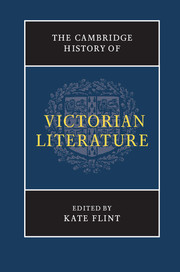Book contents
- Frontmatter
- Introduction
- PART I AUTHORS, READERS, AND PUBLISHERS
- PART II WRITING VICTORIA’s ENGLAND
- PART III MODES OF WRITING
- PART IV MATTERS OF DEBATE
- 15 Education
- 16 Spirituality
- 17 Material
- 18 Economics and finance
- 19 History
- 20 Sexuality
- 21 Aesthetics
- 22 Science and literature
- 23 Subjectivity, psychology, and the imagination
- 24 Cityscapes
- 25 The rural scene: Victorian literature and the natural world
- 26 ‘The annihilation of space and time’: literature and technology
- PART V SPACES OF WRITING
- PART VI VICTORIAN AFTERLIVES
- Select bibliography
- Index
18 - Economics and finance
from PART IV - MATTERS OF DEBATE
Published online by Cambridge University Press: 28 March 2012
- Frontmatter
- Introduction
- PART I AUTHORS, READERS, AND PUBLISHERS
- PART II WRITING VICTORIA’s ENGLAND
- PART III MODES OF WRITING
- PART IV MATTERS OF DEBATE
- 15 Education
- 16 Spirituality
- 17 Material
- 18 Economics and finance
- 19 History
- 20 Sexuality
- 21 Aesthetics
- 22 Science and literature
- 23 Subjectivity, psychology, and the imagination
- 24 Cityscapes
- 25 The rural scene: Victorian literature and the natural world
- 26 ‘The annihilation of space and time’: literature and technology
- PART V SPACES OF WRITING
- PART VI VICTORIAN AFTERLIVES
- Select bibliography
- Index
Summary
The years of Queen Victoria’s reign witnessed rapid and dramatic changes in Britain’s financial infrastructure, its own economic well-being and its place in the global economy, and the way that economic developments were conceptualized, by experts and ordinary Britons alike. Various kinds of writing – from economic treatises to financial journalism to imaginative literature – contributed to these changes in several ways, not least in making ‘the economy’ imaginable as one of the invisible, but inescapable, forces influencing nearly every aspect of nineteenth-century life.
By the time Victoria assumed the throne in 1837, London had become the financial capital of the world, having surpassed Paris and Amsterdam, which occupied this position at the end of the eighteenth century. Almost all foreign and domestic bills of exchange flowed through the London bill broking houses centred around Lombard Street; the great merchant bankers who routed English capital overseas had their offices in the narrow streets near Caple Court; and the principal institutions of British finance – the Bank of England, the London Stock Exchange, and the Royal Exchange (which burned in 1838 and was rebuilt in the 1840s) – clustered in the district known as the City, near the Bank’s home on Threadneedle Street. In addition to facilitating overseas investment, these institutions also formed the hub of what was just beginning to be a trunk-and-branch system of English banking.
- Type
- Chapter
- Information
- The Cambridge History of Victorian Literature , pp. 388 - 404Publisher: Cambridge University PressPrint publication year: 2012
- 1
- Cited by

